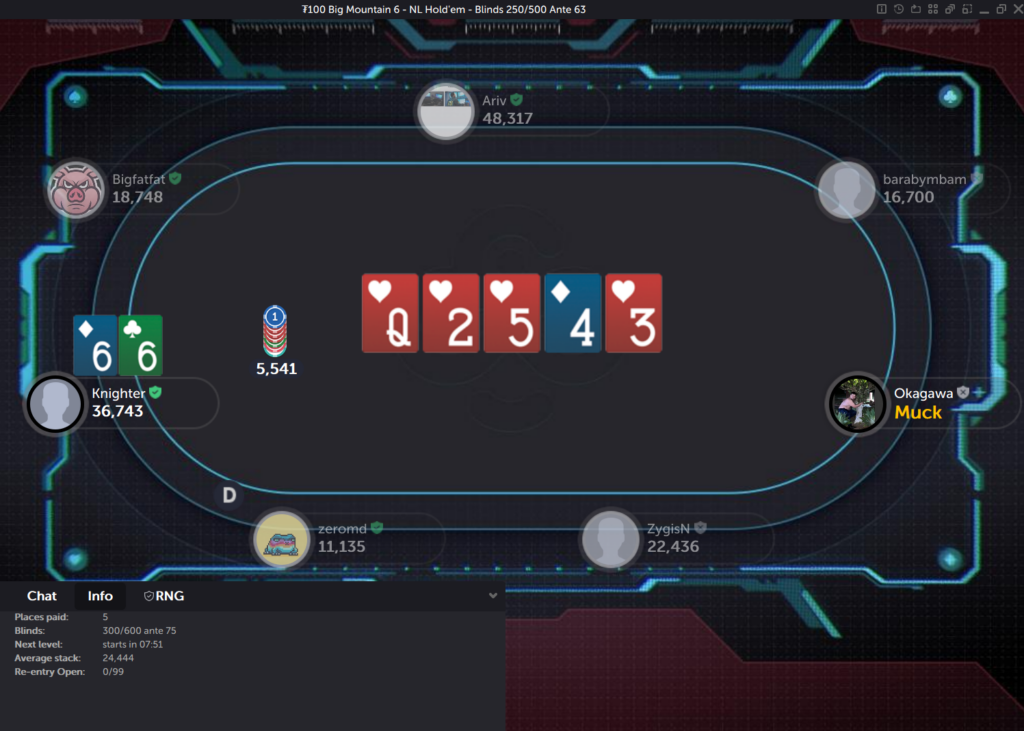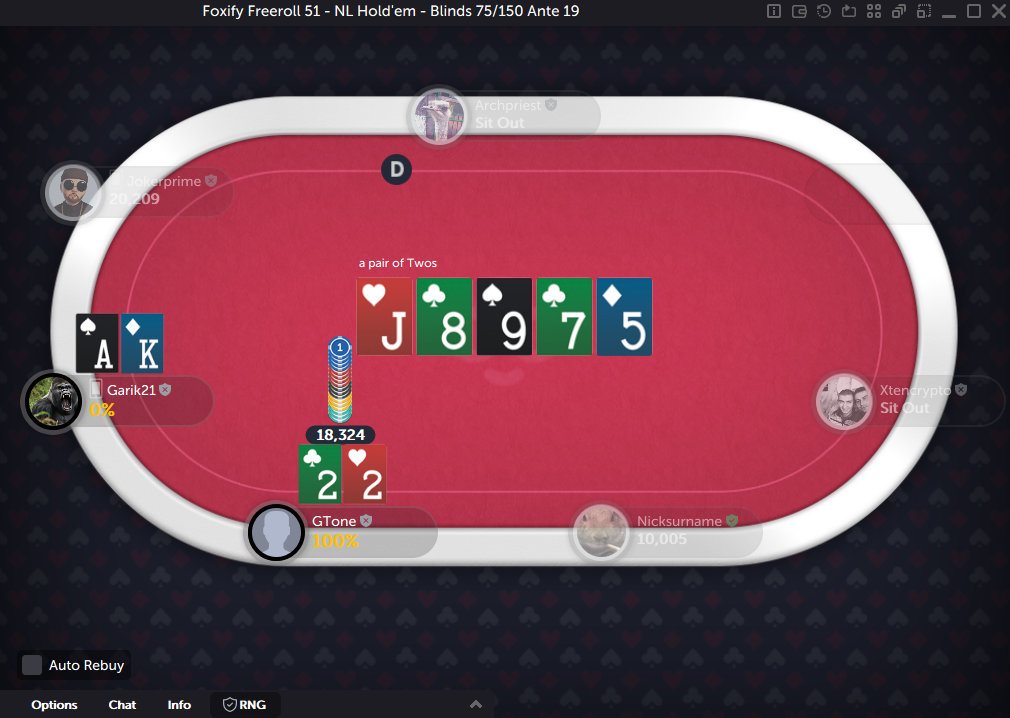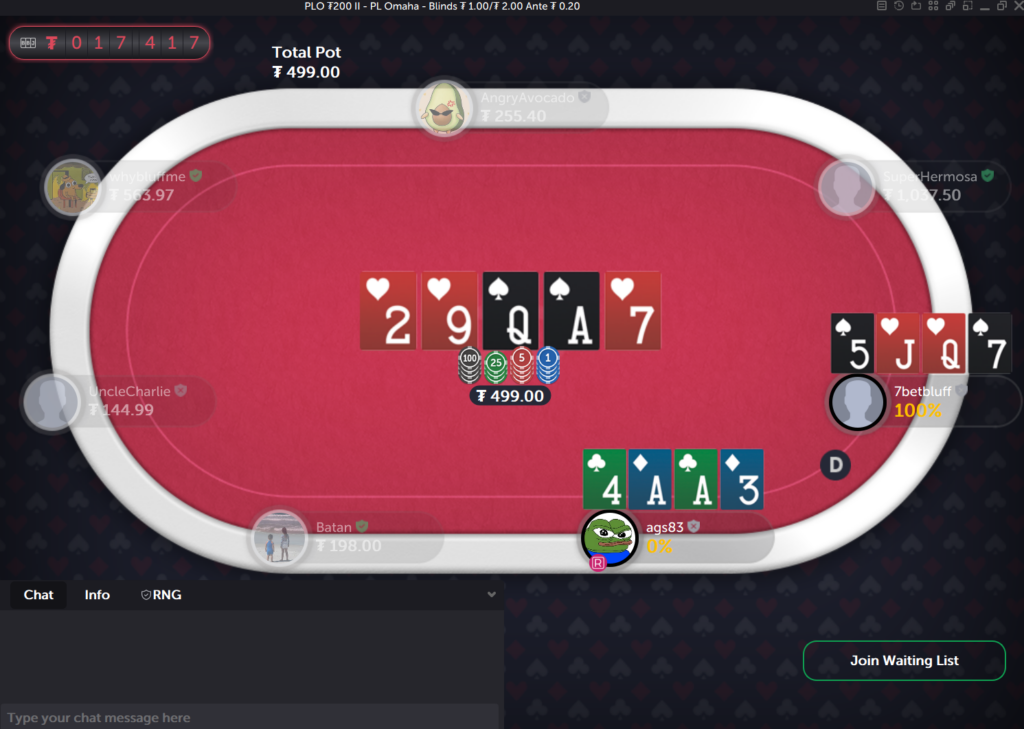Last Updated: 27 August 2025
Pocket Pair Poker: Full Guide to Playing Pairs
Learn about how to play pairs in your hand, also known pocket pair poker hands.
GuidesAt CoinPoker, we know that pocket pair poker can be both thrilling and terrifying to play. Whether you’re clutching pocket rockets or holding humble deuces, these hands have a way of making your heart race and your palms sweat. But don’t worry – we’re here to turn that anxiety into advantage with our comprehensive guide to playing pocket pair poker like a pro. Your bankroll will thank us later.
What is a Pocket Pair in Poker?
A pocket pair in poker is when your two private hole cards are of the same rank. Think of it as being dealt twins – whether they’re royals like Aces or humble like twos, you’re starting with a ready-made pair before the community cards hit the felt.
Your pocket pair gives you a head start on building strong hands, kind of like having a foundation already laid when building a house. You can build up to a sturdy three-of-a-kind (called a “set” when you use both hole cards), construct a full house, or even create the penthouse suite of poker hands – four of a kind.
Just remember, some pocket pairs look better before the flop than after. Even mighty pocket Kings can turn into a sad story when an Ace crashes the party on the flop. The key is knowing when your pair is worth fighting for and when it’s time to fold and live to fight another day.

Strengths and Weaknesses of Pocket Pairs in Poker
Think of pocket pair poker hands as the Swiss Army knife of poker hands – they’re versatile, but not every tool is right for every situation. Let’s break down their strengths and weaknesses:
| Strengths | Weaknesses |
| Already have a made hand preflop (no need to “hit a pair”) | Vulnerable when overcards hit the board |
| Strong potential to make sets (three of a kind) | Easy to overvalue medium and small pairs |
| Can win without improvement against unpaired hands | Can be expensive to play if you don’t hit your set |
| Great for set-mining against aggressive opponents who can’t fold | Tricky to continue with when facing heavy action (are they bluffing or crushing you?) |
| Premium pairs (JJ+) can dominate lower pairs | Lower pairs often need to improve to win at showdown (sorry, pocket deuces) |
The secret is knowing which strength to lean on – or which weakness to protect – in any given situation.
Poker Pocket Pair Nicknames
Poker players love nicknames, and pocket pairs have some of the most colorful ones. These aren’t just random labels – many have fascinating stories behind them:
- Aces: “Pocket Rockets” (they blast off to victory), “Bullets” (they’re deadly), “American Airlines” (AA)
- Kings: “Cowboys” (they ride high), “King Kong” (they’re monsters preflop)
- Queens: “Ladies” (obvious but classic), “Valentines” (because they’ll break your heart)
- Jacks: “Hooks” (they’ll catch you), “Fishhooks” (they’re dangerous but fragile)
- Tens: “Dimes” (US ten-cent coin)
- Eights: “Snowmen” (they look like ⛄)
- Sevens: “Walking Sticks” (they look like them), “Hockey Sticks” (same reason)
- Fives: “Nickels” (US five-cent coin)
- Deuces: “Ducks” (they look like swimming ducks)
What Are the Highest Pocket Pairs in Poker?
Premium pocket pair poker hands are the ones that make everyone at the table sit up and take notice. We’re talking about the heavyweights: Aces, Kings, Queens, and Jacks (though some might argue about those Jacks).
Pocket Aces, the granddaddy of all starting hands, wins about 85% of the time against random hands preflop. That’s like bringing a tank to a knife fight! But remember, even tanks can be defeated with the right strategy or a bit of bad luck.
The hierarchy goes like this, from strongest to “well, it’s still pretty good”:
- Aces (AA) – The preflop nuts (the best possible hand preflop)
- Kings (KK) – A monster until an Ace appears (then it becomes a hand-wringing disaster)
- Queens (QQ) – Strong but vulnerable to both Aces and Kings
- Jacks (JJ) – The hand that makes poker players question their life choices. It’s almost strong enough to give you hope when the chips go in the middle, but you never feel good about it.
- Tens (TT) sit in that awkward middle ground – like being the youngest kid at the adults’ table or the oldest at the kids’ table. While not technically premium, they’re strong enough to throw their weight around in many situations.
What Are the Lowest Pocket Pairs in Poker?
The lowest pocket pair in poker is a pair of deuces (2-2), affectionately known as “ducks” – probably because they often need to swim away from trouble. But don’t dismiss these little guys – even small pairs can pack a surprising punch when played correctly.
Small pairs include:
- Twos (22) – The ultimate underdog. Like a chihuahua that thinks its a Great Dane, deuces have more heart than actual bite.
- Threes (33) – Crawling along the bottom
- Fours (44) – “Sailboats)” that spend most of their time just trying to stay afloat. One big wave (overcard) and they’re taking on water.
- Fives (55) – The “speed limit” hand that rarely gets you where you’re going fast enough. They usually look better in the rear-view mirror.
- Sixes (66) – The highest of the low, like being the tallest short person in the room. They’re technically small pairs, but they’ll puff up their chest when all the overcards miss.
These hands might look unimpressive, but they have a hidden superpower: set mining. When you flop a set with a small pair, your hand is often well-disguised, which can help you win massive pots from opponents who can’t imagine you’d play such a “weak” hand.
Odds of Pocket Pairs in Poker
Let’s talk numbers, but don’t worry – we’ll keep the math friendly. The odds of being dealt any pocket pair are surprisingly slim:
| Hand Type | Odds | Percentage | Frequency |
| Any Pocket Pair | 16 to 1 | 6.25% | Once every 16 hands |
| Specific Pocket Pair (i.e. Any Aces) | 220 to 1 | 0.45% | Once every 220 hands |
| Premium Pairs (JJ+) | 54 to 1 | 1.85% | Once every 54 hands |
| Middle Pairs (77-TT) | 54 to 1 | 1.85% | Once every 55 hands |
| Small Pairs (22-66) | 43 to 1 | 2.26% | Once every 44 hands |
Think about it this way: if you’re dealt pocket Aces, celebrate! You’re witnessing something rarer than a solar eclipse (which happens about twice a year). At once every 220 hands, you might see pocket rockets only a few times in a long session – assuming you’re lucky enough to get dealt them at all!
Odds of Hitting Sets with Pocket Pairs (Set Mining)
Set mining is like fishing – you’re investing a little bit of bait (your call) hoping to catch a big fish (your opponent’s stack). When you have a pocket pair, the odds of flopping a set are approximately 7.5 to 1 against (about 11.75%).
But here’s where it gets interesting: successful set mining isn’t just about flopping your set – it’s about getting paid when you hit. You need the right implied odds, like a treasure map leading to your opponent’s stack. The general rule? You want the potential payoff to be at least 10 times your investment.
For example, if it costs you $10 to call preflop, you should expect to win at least $100 when you hit your set. Otherwise, you’re like a prospector spending $100 on equipment to mine for $50 worth of gold – not exactly a winning business model.
Strategy for Playing Pocket Pairs in Poker
Playing pocket pair poker effectively is like being a chess master – you need to think several moves ahead and consider multiple factors:
- Stack Size:
- Deep stacks (100BB+): Perfect for set mining with small pairs
- Short stacks (>20BB): More about direct value, less about set mining
- Medium stacks: Walking the tightrope between both strategies
- Position:
- Early position: Play like a scared bunny with small/medium pairs
- Late position: Channel your inner lion, especially with strong pairs
- Blind defense: Consider pot odds and whether your opponent is a maniac
- Opposition:
- Tight players: Value bet them like you’re selling ice in the desert
- Loose players: Set mine their stack like it’s going out of style
- Aggressive players: Let them hang themselves with their own rope
Remember, these aren’t just guidelines – they’re the difference between being a long-term winner and wondering where your bankroll went.
Things to Remember When Playing Pocket Pairs
Here’s your pocket pair poker cheat sheet, or what we like to call “How Not to Dust Off Your Stack 101”:
- Don’t play every pocket pair like it’s pocket Aces
- Read the room: table dynamics matter more than your card strength
- Small pairs are for set mining, not going to war
- Premium pairs are for building pots, not slow-playing yourself into trouble
- Position is king – what works in late position might be disaster in early position
- If you’re facing multiple raises, you probably don’t have the best pair anymore
- Learn to fold those pretty pairs when the action tells you you’re beat
- Practice proper bankroll management – set mining requires a cushion
- Watch for opponents who can’t fold overpairs – they’re your best customers
- Remember: patience pays, but timidity costs
Pocket Pairs in Texas Hold’em
In Texas Hold’em, pocket pairs are like a good marriage – the relationship changes over time based on what life (the board) throws at you. Your approach needs to adapt to several key factors:
Board texture: A pocket pair’s strength can evaporate faster than a puddle in the desert when scary cards appear. Those pocket nines look mighty weak when K-Q-J hits the flop!
Number of opponents: More players mean more chances someone’s hit something better. It’s like a party – fun with a few friends, scary with a crowd.
Position: Late position is your best friend with pocket pairs.
Stack depths: Deep stacks make small pairs playable for set mining. Short stacks mean you might have to take a stand with those medium pairs.
Tournament vs. cash game dynamics: In tournaments, you can’t always wait for the perfect spot – sometimes those medium pairs have to go to war. In cash games, patience is more than a virtue – it’s profitable.

Pocket Pairs in Omaha (PLO and PLO5)
If pocket pairs in Hold’em are like a marriage, in Omaha they’re more like a high school romance – exciting but often disappointing. Here’s why:
- They’re way less valuable preflop because everyone has four cards.
- You need strong supporting cards (think Broadway cards) to maximize value.
- Set-over-set situations happen often.
- Those “premium” Hold’em pairs? In PLO, they’re often trap hands.
- Without good side cards, pocket Aces can be a one-way ticket to Bustville.

In PLO5 (five card Omaha), pairs become even more diluted, so be careful.
Key strategy adjustments:
- Look for double-suited pairs with connected cards.
- Avoid playing naked pairs (pairs without strong side cards).
- Be ready to fold sets more often – full houses are the new trips.
- Position matters even more than in Hold’em.
- Remember that nut draws are often better than made hands.
Practice Playing with Pocket Pairs Here
Ready to put your pocket pair prowess to the test? At CoinPoker, we’ve got tables that are perfect for practicing your newfound knowledge, whether you’re looking to set mine in our cash games or build a stack in our tournaments.
Sign up to CoinPoker now and we’ll even throw in a welcome bonus to kickstart your bankroll. Remember, mastering pocket pairs is like learning to ride a bike – it takes practice, you might fall a few times, but once you get it, you’ll never forget. Come join us and turn those pocket pairs into profits!
FAQs
Two hole cards of equal rank dealt as your starting hand in poker.
A pair of deuces (2-2) is the lowest possible pocket pair in poker.
The odds of being dealt pocket aces are approximately 220 to 1, occurring once every 220 hands on average.
You’ll flop a set approximately 11.8% of the time when holding a pocket pair, or roughly once every 8.5 attempts.
No, the decision to raise with pocket pairs depends on position, stack size, opposition, and table dynamics.
Explore More
Announcements
Read recent announcements from CoinPoker about new games, ambassadors, and changes to our platform.
8 PostsGuides
The go-to resource for mastering poker with expert tips and strategies. Whether you're a beginner or a pro, our guides will elevate your skill level.
60 PostsNews
Find the latest poker news from CoinPoker, plus our latest CoinPoker Weekly and Monthly Newsletters. Updates about games, promotions and other exciting crypto news.
90 PostsPromotions
Find the latest coinpoker promotions here. Explore the crypto poker world with the best poker promotions available.
1 Post
















